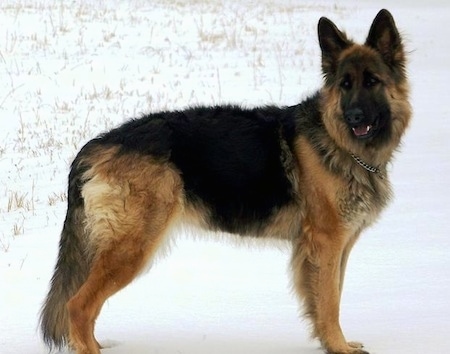
Twin Willows Mia of Lpckingshepherd, aka Mia the King Shepherd at 2 years old—"Mia is the best dog I have ever owned. She is very smart and loyal. She just loves to be with the family and loves to ride in the car. Thank god I watched Cesar Millan. It helped me a lot with training her as a pup. Socialize, socialize, exercise, discipline and praise."
king shep-erd
The build of the King Shepherd is slightly long, robust and muscular; the structure is solid. The head is in good proportion to the body and moderately wide between the eyes. The forehead, seen from in front and in profile, is only slightly rounded, with or without a medial furrow which is moderately well defined. The cheeks are not too full, are moderately curved, when viewed from the top should be much in the form of a "V," and are well filled in under the eyes. The thick, firm ears are of medium size, moderately wide at the base, set on high and pointed; they are carried erect and slightly forward (puppies up to the age of 4-6 months, and sometimes older, do not carry their ears completely erect). The eyes are medium size and almond-shaped, set somewhat aslant and not protuberant, as nearly as possible matching the surrounding coat in shades of brown, and from very light to dark are acceptable. The chest is deep and broad. Thickly feathered, the tail reaches at least to the hocks. The tail is carried down and slightly curved; when excited or in movement, the dog raises the tail, which becomes more curved, without however, going beyond the vertical. It must not, moreover, lie on or curl up on the back. Docked tails are inadmissible. The paws are round and short with a well-closed, arched. The pads are very hard. The nails are short and strong, generally dark in color. Dewclaws are usually removed. The King Shepherd comes in a wide range of acceptable colors. These are as follows: sable (brownish tan with brown or black markings, or grayish silver with black markings); black saddle with tan, gold, cream, tan or silver markings. Strong, rich colors and pigments are highly preferred. Small white spots on the chest are acceptable. Pale, washed-out colors are serious faults. The undercoat is invariably little colored, except in black dogs. White, blue or liver-colored dogs or a dog with a nose that is not black are not accepted in the show ring. Puppies change color from birth until they get their final coat. There are two coat varieties: coarse-haired, which is straight and longhaired, which is light and wavy.
The King Shepherd is self-confident with a well-balanced nervous system and should not be shy. Extremely intelligent and easy to train. Faithful and eager to please its owner, this breed makes a fine working dog and sheep-herder. A courageous watch and guard dog showing courage and hardiness in his role of protector, it makes a very nice companion. The King Shepherd is full of strength and vigor. Friendly toward strangers, children and other animals. A docile, obedient breed with an easy gait and plenty of stamina. The objective in training this dog is to achieve pack leader status. It is a natural instinct for a dog to have an order in its pack. When we humans live with dogs, we become their pack. The entire pack cooperates under a single leader. Lines are clearly defined and rules are set. Because adog communicates his displeasure with growling and eventually biting, all other humans MUST be higher up in the order than the dog. The humans must be the ones making the decisions, not the dogs. That is the only way your relationship with your dog can be a complete success.
Height: 25 - 29 inches (64 - 74 cm)
Weight: 90 - 150 pounds (41 - 69 kg)
--
The King Shepherd is not recommended for apartment life. It does best with at least a large yard.
The King Shepherd love strenuous activity, preferably combined with training of some kind, for this dog is very intelligent and craves a good challenge. It needs to be taken on a daily, brisk, long walk, jog or run alongside you when you bicycle. If under-exercised, this breed can become restless and destructive. While out on the walk the dog must be made to heel beside or behind the person holding the lead, as in a dog's mind the leader leads the way, and that leader needs to be the human.
10-11 years
About 6 to 10 puppies
The coat is highly weather-resistant. The King Shepherd should be brushed regularly. Bathe only when necessary.
American dog breeders Shelley Watts-Cross and David Turkheimer developed this large breed from American and European German Shepherd Dogs, Alaskan Malamutes and Great Pyrenees. An official breed club was established in 1995.
Herding
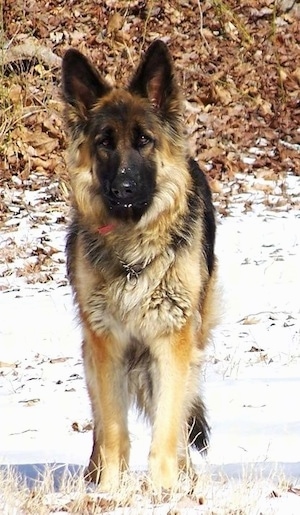
Twin Willows Mia of Lpckingshepherd, aka Mia the King Shepherd at 2 years old
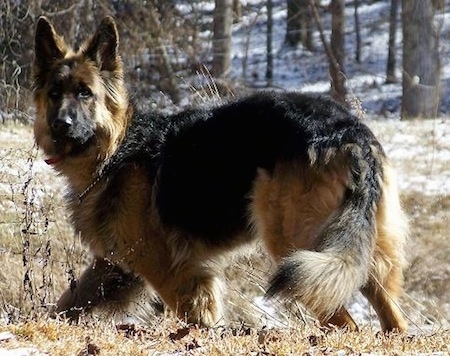
Twin Willows Mia of Lpckingshepherd, aka Mia the King Shepherd at 2 years old
Lil’ Red the King Shepherd, photo courtesy of Amy's Acres King Shepherds
King Shepherds—"The dog on the left is a 20-month-old female named Windy, weighing 90 pounds and 29" tall at the shoulders. On the right is a 28-month-old male named Berrin, weighing 115 pounds and 31" tall at the highest point of the shoulders." Photo courtesy of Amy's Acres King Shepherds
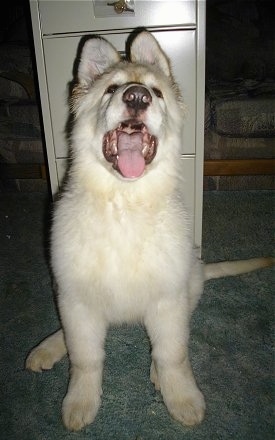
"This photo was taken in front of a standard size filing cabinet. The pup is a few days shy of 12 weeks old. Powder Milk Bisquet of Amy's Acres is 34 lbs. and her ears top the second drawer of the cabinet, to give an example of just how large these Shepherds are, even as puppies. This pup is from a Berrin / Lady litter." Photo courtesy of Amy's Acres King Shepherds
Polar the King Shepherd, photo courtesy of Amy's Acres King Shepherds
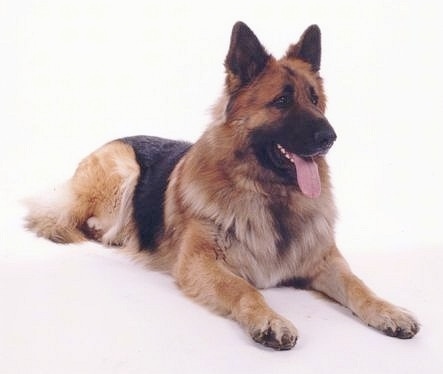
Grand Monarch Ch. Chateau De Chief’s Bustah Bruin, owned and bred by Shelley Watts-Cross and George Cross, Chateau De Chief Kennels
Maja, a King Shepherd puppy at 5 weeks old
Niko the King Shepherd puppy at 3 months old
Niko the King Shepherd puppy at 4 months old